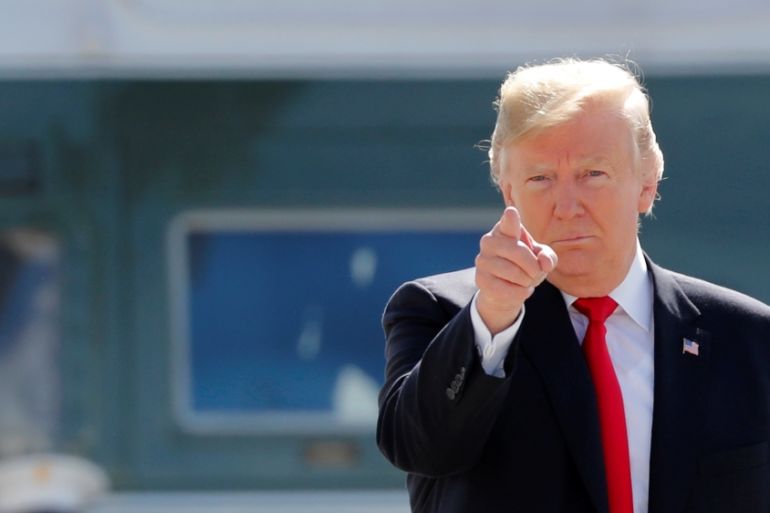Trump can only go that far with his unilateralism
Trump’s unilateral vision of the world will hurt the US, but it might also undermine his presidency.

Long gone are the days when authoritarian leaders of the Global South, like Muammar al-Gaddafi and Hugo Chavez, were stealing the show at the United Nations General Assembly meetings in New York. Today, it is US President Donald Trump, the leader of the “free world”.
Within the first lines of his General Assembly speech, he managed to get an audience of diplomats and world leaders laughing at his haughty claim that his administration has done much more than any other in US history. This reflected the unprecedented low global standing the US leadership “enjoys” these days.
Keep reading
list of 4 items‘Any time, any place’: Biden and Trump agree to June and September debates
Biden slaps new tariffs on Chinese imports, ratcheting trade war
Key takeaways as Cohen faces more questioning on day 17 of Trump’s trial
But despite the scorn which Trump’s speech was met with at the General Assembly hall, the vision of the world he outlined is indeed disconcerting. Trump talked about a future in which unilateralism, militarism and the pursuit of one’s self-interest are put above international cooperation, integration and trade. What he is suggesting is basically the end of the global liberal order which the US has been leading since the end of the World War II and which it solidified after the collapse of the Soviet Union.
The Trump administration has already come after various international organisations and multilateral agreements. It has withdrawn from the climate change accords, UNESCO, the Human Rights Council, and the Trans-Pacific Partnership trade deal, undermined the International Criminal Court (ICC) and cut funding for UNRWA.
It has also strained relations with its traditional allies, Canada and the EU, and picked up a trade war with China. It has pulled out the of the Joint Comprehensive Plan of Action (JCPOA) deal with Iran and rendered the Palestinian-Israeli peace talks even more obsolete. On Syria and Yemen, it has remained reluctant to play a role in advancing any viable solution to the two conflicts.
If Trump continues down this path, there are implications for both the United States and the international system. Burning bridges with traditional allies increases the isolation of the US and undermines its global leadership.
A year and a half into his presidency, Trump struggled to name friends in his UN speech. He could think of just four: India, Israel, Poland and Saudi Arabia.
More importantly, his unilateral decisions, including trade wars and excessive sanctions, endanger the primacy of the US dollar in the global financial system. Nations around the world increasingly believe they should be less dependent or even less integrated in the American financial system, which ultimately would weaken the US dollar. We are already seeing initial steps in that direction, most notably following US sanctions on Iran and Turkey as well as the trade war with China.
On September 25, the EU’s foreign affairs chief, Frederica Mogherini, unveiled a plan to set up a new financial entity to help companies seeking to do business with Iran evade US sanctions. A day later, speaking at business event in New York, she said: “The dollar is not the only currency on earth – we have the euro, others have their own currency.”
The EU’s new financial vehicle will only be useful to businesses operating outside the US banking system, but it reflects a global trend of abandoning the dollar as trade exchange currency.
Furthermore, when a dominant superpower like the US challenges the principle of multilateralism and the international legal order, it will be harder to convince rogue states not to follow suit.
For instance, Trump chose to engage with North Korea in bilateral talks sidelining international institutions and regional actors. He also encouraged other nations to act in the same way by welcoming the Sochi agreement between Turkey and Russia on Syria, which was neither negotiated nor endorsed by the UN.
This approach to international diplomacy increases the risk of miscalculations and is reminiscent of the post-9/11 mentality of the Bush administration which believed that the unilateral use of force and coercion is a better approach than diplomacy for achieving US objectives.
But apart from outlining a vision of unrestrained unilateralism in US foreign and economic policies, Trump also inadvertently showed signs of his own anxiety about the potential fallout of such a strategy. In his speech to the UN Security Council, he went on to accuse China of interfering in the upcoming midterm elections, a claim that is yet to be corroborated by the US intelligence community.
What these claims show, however, is that Trump might be fearing that the US farmers in Iowa and beyond who lost the Chinese market because of the trade war he started might vote against him and his Republican party in November.
While former US allies are already building mechanisms to circumvent the need to deal with Trump, neither they, nor international institutions like the UN are likely to confront him. In the end, it is going to be up to the American voter to restrain Trump’s unilateral adventurism.
The views expressed in this article are the author’s own and do not necessarily reflect Al Jazeera’s editorial stance.
